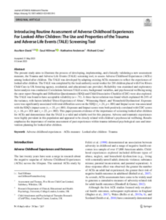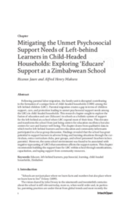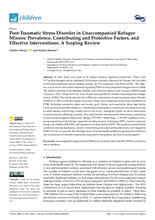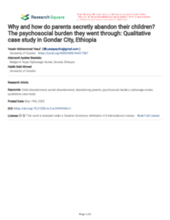Displaying 21 - 30 of 501
This UK-based paper presents evidence of the importance of screening looked-after children for Adverse Childhood Experiences and demonstrates that the Trauma and Adverse Life Events (TALE) is a valid and reliable tool for this purpose. Adverse and traumatic experiences were highly prevalent in this population and appeared to be closely related with children’s psychosocial wellbeing.
The objective of this webinar was to present the best practices learnt in the implementation of the foster care system as an alternative to limited child care institutions for children on the move in The Gambia.
This exploratory, sequential, mixed-methods study analyses factors that enhance the provision of psychosocial support services and the perceptions of educators towards psychosocial support delivery to orphaned and vulnerable learners in Eswatini.
This research chapter sought to explore the fusion of education and care in schools in Zimbabwe as a holistic system of support for the left-behind at a school where left-behind children expend most of their time.
The objective of this global study was to review the current literature regarding PTSD in unaccompanied refugee minors (URM). The authors concluded that the high levels of mental health problems experienced in URM are due to exposure to traumatic experiences, separation from parents, and lack of social support.
This study explored the lived experiences of mothers/fathers who secretly abandoned their children in Ethiopia.
Cette note d'orientation vise à aider les responsables de la mise en œuvre des programmes, les coordinateurs et les autres acteurs humanitaires à lutter contre le suicide et l'automutilation dans les contextes humanitaires.
This guidance note aims to support programme implementers, coordinators, and other humanitarian actors in addressing suicide and self-harm in humanitarian settings.
本指导说明旨在支持项目实施者、协调员和其他人道主义行为者解决人道主义环境中的自杀和自残问题。 它汇集了范围广泛的方法、工具、参考资料和案例示例。 它是一种实用而简洁的资源,适用于所有类型的紧急情况、组织和部门。
Esta nota de orientación tiene como objetivo ayudar a los implementadores de programas, coordinadores y otros actores humanitarios a abordar el suicidio y las autolesiones en entornos humanitarios. Reúne una amplia gama de enfoques, herramientas, materiales de referencia y ejemplos de casos. Es un recurso práctico y conciso aplicable a todo tipo de emergencias, organizaciones y sectores.









